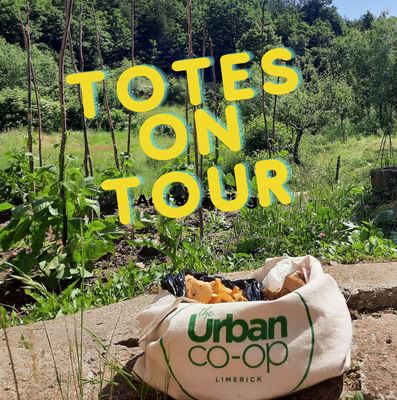|
We know our totes are travelling far and wide and having marvellous adventures. Enjoy reading about one tote on tour and we welcome other members to share their food stories too. Us armchair travellers will revel in them.
We are very aware that our destination will offer none of the fresh, locally sourced, organic produce which we enjoy at the Urban Co-op in Limerick. The local shop, we heard, opens for a short time each day and has limited supplies. The locals grow their own food, so all they want at the shop are cheap sweets, white flour, sugar, coffee and alcohol. So we have been advised to stop at the nearest town, if we need such luxuries as fresh fruit and vegetables, brown bread or good butter. Once we are well stocked up, we continue on the bumpy road until it ends in Polyana - an old mountain village near the Greek border, at 1200 meters above sea level. It is home to about 40 Bulgarians, and for the following 6 weeks it will be home to us. As we turn the final corner, our driver - who hasn't said a word for the duration of the trip - waves his hand towards the mountainous horizon. With pride in his voice and a glint in his eye he exclaims in English: "Freedom!" The glorious days of this village were during communist times, when 350 people lived here. The peasant way of life was valued, even glorified. There was a Community Center, a disco and a dairy factory. Now, most houses are abandoned and ruined. It is quiet here and only older people remain. The younger generations have moved to bigger cities or abroad for jobs and a more modern lifestyle. In preparation for our stay I've worked hard to learn the language. It was difficult to say the least - very different from any other language I know. So our conversation with the locals is mostly limited to "Good morning", "We're walking in the forest today" and "We're pitching the tents in the mountains". These expressions are mostly met with laughter or looks of disbelief. The antics of these foreign visitors will likely remain a mystery to the villagers. And equally, the customs and unwritten rules of village life cannot be decoded by us in a short summer stay. We remain outside observers. What we have learned is that winter lasts for about 6 months. Everyone stays inside during this time. Safely tucked away from -20 °C and one to two meters of snow. The most important questions at these times are: "Are you alright?", "Do you have wood?". Staying warm is the number one concern. As soon as spring arrives - which could be in April or later - nature comes alive and an incredibly diverse flora and fauna spring up in the landscape. People emerge from their houses and can be found in the many thriving vegetable patches around the village. Potatoes, corn and beans are the main crops, and the locals - irrespective of their age or physical condition - tend to them daily in backbreaking work. Here and there a horse and cart help with the hardest jobs. We may not understand each other verbally. We may have completely different customs, rules and routines. But one thing connects us all: Food. When the vegetable truck arrives, it causes great excitement. Everyone gathers for a chat and to see what produce is available this week. The little shop, too, is a place to gather. But most important of all is the food that people make for each other. 52 days after someone dies, the family prepares meat, bread and drinks and gives some to everyone in the village. Even the foreigners were included in this custom. Our mushroom picking neighbour goes across the little river a few times to collect mushrooms. When we show him a picture of chanterelles he knows exactly what we mean. It's not a mushroom he is interested in himself, but he knows where to get them and returns one morning with a big bag of these precious goodies as a present for us. And to turn our meal that day into a feast, he throws in two bottles of his own wine, too. We can only thank him with hand gestures, facial expressions and noises. "Hmmmm!" "So good!" "Thank you!". We're like good friends now - across the divide of language, culture and lifestyle, we are all people who appreciate a friendly gesture and some good food. As our visit comes to an end, I can't shake the impression that these people are not really poor. They are debt free, independent and physically strong. And they appear at peace with their life. Could they have found this elusive quality we call happiness? Their life is simple, for sure, but given the choice, would they leave this life for another? I will take my tote and visit another place on earth, but I will treasure the memories of this stay in my heart forever. Let us know your Totes on Tour stories Email Anne [email protected]
0 Comments
Your comment will be posted after it is approved.
Leave a Reply. |
Categories
All
Archives
July 2024
AuthorsRecipes from Katie Verling & Jacques |


 RSS Feed
RSS Feed